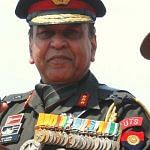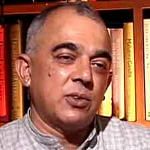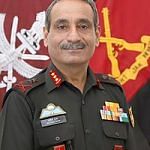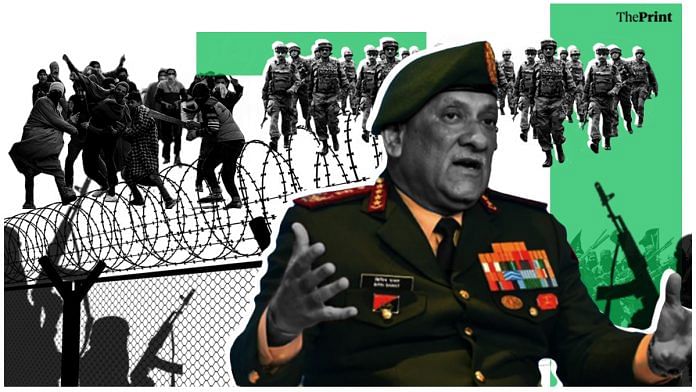Chief of Defence Staff General Bipin Rawat said that India has de-radicalisation camps for the young. He also said that 10-12 years old from Kashmir were being radicalised. Opposition leaders Sitaram Yechury and Asaduddin Owaisi have slammed Rawat’s remarks at the Raisina Dialogue saying he shouldn’t be speaking on such issues. Owaisi even asked who will “de-radicalise” Mohammed Akhlaq and Pehlu Khan’s killers.
ThePrint asks: Has CDS Gen Bipin Rawat overstepped his brief by speaking on ‘de-radicalisation camps’?
Countering security threats arising from terrorism in Kashmir is the responsibility of Armed Forces
 Lt Gen. Syed Ata Hasnain (Retd)
Lt Gen. Syed Ata Hasnain (Retd)
Former GOC of Srinagar-based 15 Corps, associated with the Vivekananda International Foundation and the Institute of Peace and Conflict Studies
CDS Gen Bipin Rawat’s public statements have been under scrutiny for some time now. At the Raisina Dialogue 2020, he spoke extensively on the threats of religious radicalisation in Kashmir. He said that children as young as 12 years of age were completely radicalised and should be taken to de-radicalisation camps.
First, the connection between religious radicalisation and terrorism cannot be denied. Radical ideology forms an essential element of the eco-system that drives terror in Kashmir and elsewhere. Countering the security threats arising from terrorism as part of hybrid war in Kashmir is the responsibility of the Armed Forces. As the Chief of Defence Staff, General Rawat is expected to give leadership and direction in understanding the threat and its neutralisation. The subject is well within his purview.
However, there is no known information about de-radicalisation camps in India. Perhaps, Rawat meant de-radicalisation ‘centres’, which do exist under government initiatives. The mention of ‘camps’ reminds one of Xinjiang in China, where Uyghur Muslims are kept and persecuted without remorse. China has incarcerated thousands of Uyghur Muslims in such camps to break their will to follow Islam.
But India cannot be compared to China. India does face a problem of religious radicalism, which has manifested in anti-national acts and organised terror. But it has both counter-radicalisation and de-radicalisation programmes, and is attempting to follow the Singapore model of employing a rational and committed clergy to preach middle-path faith.
Former PMs such as Vajpayee would never approve of such military chiefs. What Rawat said goes beyond his brief
 Manvendra Singh
Manvendra Singh
Congress leader and Editor-in-Chief of Defence & Security Alert
The Indian Army makes accommodations for soldiers from all faiths by setting up a ‘Sarva Dharma Sthal’ (a prayer hall). Here, there are holy books from all religions so that soldiers can come together and pray. This is the ethos of the Indian Army and it is a reflection of the country’s diversity.
General Bipin Rawat’s comment on radical youths in Kashmir violates this ethos. What he said questions the ethos of the Army and is beyond the brief that he holds. De-radicalisation camps are completely un-Indian and the assumption that they are needed for a certain age group in one area of the country is clearly a fantasy. It’s not the duty of the state to teach citizens the ‘right’ or ‘moderate’ kind of religion.
Former prime ministers would never approve of such military chiefs and political leaders such as Atal Bihari Vajpayee has in the past even sacked a serving chief for going beyond his brief. If Vajpayee was still alive, he would have been aghast after reading today’s newspapers.
I would also like to ask why such camps have not been set up with equal rigour in Naxal-hit states? Naxalites in Chhattisgarh and Jharkhand influence far more people than the so-called radical youths in Kashmir, and they are a far bigger serious threat to national security. The Army Training Command had flagged this issue way back in 1997.
CDS’ remarks not out of place. India is facing a hybrid warfare at conventional and sub-conventional levels
 Adil Rasheed
Adil Rasheed
Research Fellow, IDSA
As part of their campaign to fight Pakistan-backed terrorism, the Indian military and security forces have always sought to win the hearts and minds of the people of Jammu and Kashmir.
India is confronting a new form of hybrid warfare that is being waged not only at the conventional and sub-conventional levels, but also on social, psychological, ideational, and religious planes. This requires a corresponding and befitting response, in sync with all national and international humanitarian laws and principles.
Therefore, the statement by Chief of Defence Staff General Bipin Rawat on the measures taken to counter radicalisation can in no way be construed as being out of place.
The CDS has rightly highlighted that such counter-radicalisation efforts are being undertaken even by Pakistan. As Shakespeare would put it: “bloody instructions, which being taught return to plague the inventor.” Many countries are running de-radicalisation programmes, from European nations to even Saudi Arabia. So, it would be best to keep politics out of such sensitive issues and not drag important security-related matters into the realm of public debate and speculation.
Gen Rawat’s remark must not be seen through lens of minority persecution. Radicalisation not community-centric issue
 Lt Gen Satish Dua (Retd)
Lt Gen Satish Dua (Retd)
Former chief of Integrated Defence Staff, Indian Army
Weeding out radicals is a concern for most countries across the world. Countries like Indonesia have de-radicalisation centres in Bali and Jakarta. Even Muslim-majority countries that have experienced the wrath of ISIS are suffering due to radicalisation. Therefore, it’s not a community-centric problem, and Gen Bipin Rawat’s statement should not be seen through the lens of minority persecution.
In my view, radicalisation refers to violence that is perpetrated in the name of religion. It can be seen among the youngest of civilians in Kashmir. Terrorists vehemently oppose, like Zakir Musa did, the Indian state and desire their own ‘Caliphate’ — a goal similar to ISIS.
Having served as a Corps commander in Jammu and Kashmir, I have seen stone-pelting become more and more violent in the last decade. Radicalised teenagers would come out on the streets and raise slogans in support of terrorists, start violent protests and would pelt stones at the Indian security forces when they tried to contain the situation.
After Burhan Wani’s death in July 2016, younger and younger children became radicalised. This is because young, impressionable minds are most vulnerable. Therefore, there is a great need to teach young children the right path of Islam and effectively de-radicalise their minds. Rawat was right to speak on this issue because it is a matter of national security.
CDS Gen Bipin Rawat didn’t overstep his brief but he did speak loosely on the sensitive issue
 Snehesh Alex Philip
Snehesh Alex Philip
Senior Associate Editor, ThePrint
A Chief of Defence Staff should be careful about what he says in public and know the significance of each word he utters.
CDS Gen Bipin Rawat has not overstepped his brief while responding to a question on the dangers of radicalisation in Kashmir. However, he did speak loosely on the sensitive issue and should choose his words more carefully because he holds a position of great responsibility.
He should be careful about not adding fuel to claims about Indian Muslims being in great danger. At the same time, radicalisation should not be associated with just one religion. The fact is that radicalisation is taking place in other religions too.
Gen Rawat should know that there are no deradicalisation “camps” in India, that certain words are sensitive and carry different connotations.
India has what one would call informal de-radicalisation centres. These are run by various state police forces in coordination with central agencies, just like in other countries, including Pakistan. At these centres, the family members of the youth play a crucial role in the de-radicalisation process. These centres came up when central agencies under the UPA government had flagged and detained some youth who were on their way to join the ISIS.
No cases, and rightly so, were registered against such individuals. While agencies maintain a silence, there are some local clerics who have helped with the de-radicalisation.
Also read: Will naming Masood Azhar, Dawood Ibrahim, Hafiz Saeed terrorists help India’s war on terror?
By Pia Krishnankutty, journalist at ThePrint




This is interesting. It was just yesterday that ThePrint editor Shekhar Gupta made a really nuanced and well researched video about this issue and made it clear that Gen. Rawat did not say that India should send children to deradicalization camps. Here we have most people, (except for the one obligatory Congress spokesperson) saying the same thing. Yet the intro implies that Gen. Rawat said so. Miscommunication in the Newsroom?
CDS has got over 40 years of military experience which is more than experience of Philip’s the print editor.he should not pedal his leftist ideology by criticizing pragmatic comments by CDS.
ÇDS remarks are very true and pragmatic and did not exceed brief . Those who criticise are the radical anti nationals and should be condemned . We must isolate and end terrorism from the roots .
In my most patriotic frame of mind I pray to God that the Indian Army is not “tested” at the present juncture. I see a clear mutiny within the force if soldiers are expected to put their life in danger for the sake of the country. Our armed forces have had Secularism as their staple thinking, and people like Rawat and his “like minded” officers like Narawane have clearly poisoned the waters.
A word like radicalisation is nonspecific and is open to individual perception. Was /is every stone pelter, a Muslim,is a radical deserving to be taken to a deradicalisaton camp and treated like a prospective terrorist – surely a loaded dangerous public statement for our seniomost military chief.Not OK. His could have been a private advise to the political decision makers.if they did need so. Especially given the polarised environment we are in. Unbecoming.
Such pronouncements by senior military leadership are particularly not in the interest of the basic structure and functioning of the armed forces whose raisondetre is apolitical & secular.
Even the recent comments of the present Army Chief on 370 need not have been made in public.
Camps are not the only way there are other options have a look https://www.security-risks.com/news/a-seven-level-counter-radicalisation-response—2014-redux-909.html
its a military which suffers. They have full right
Perhaps a better choice of words, if at all there is a need to speak, which is often not the case. Recall the statement that protestors in Kashmir are being hit in the face although soldiers are instructed to fire below the knees, because they were stooping to pick up stones to pelt at the forces. Or the earlier statement, I wish they would pick up guns, then we could …
Why should anybody be surprised?
As the COAS, he has been doing the same over the last three years; how could he be different as CDS. He has the go-ahead for all this from the Govt,
If a problem is not recognised it would be foolish to presume a solution would thereafter appear without an external stimulus. India cannot be isolated from the happenings all over the world. China shares an extensive boundary with India and Pakistan is the common breeding grounds for religious unrest in this region!
The CDS post newly carved and the last hunting day of Gen. Bipin got his the biggest award to take the newly constituted post. Though many were in the fray to fit this job, but sticking his name converted the post to be politically driven by the bosses sitting in the centre. Since he took office, he has constantly spoken the flavored language of the ruling elite and the recent comment of his means the defence forces already run a covet operation to take on even young Indian at 10-12 years of age. An irresponsible sign after taken the highest post clearly is driven by the moral pressure of assuming the chair appeasing the bosses in Delhi. The brainwashed Gen. needs to act swiftly in engaging the pending demands of our armed forces in procuring the most deadly needed equipments and weapons being ignored since years against failing reasons. Much to the hipe of his chair he is seen as a balanced force between the civilians and the Government at the centre by fully dedicating to the cause of securing the Nation. His desperation is looked upon as a more political voice generated firstly in the armed forces to further polarize the Indian community on religious lines. Considering the discipline standards of the armed forces he has attracted severe criticism from various corners making the chair more vulnerable in the future. I would suggest this post should be filled by a committee of reputed parliamentarians representing various political parties under the leadership of the President of India to avoid further degradation of the post by untime statements.
You muslims should read what he said. He is talking about radicalisation in your community which is a real fact. No Country unproductive people who value 5 times Namaz more than work.
He mustn’t be making political sounding statements. This is not the first time he has done this. Recently he also said Pakistan should be blacklisted by FATF. “Pakistan should be blacklisted by FATF, isolated diplomatically: CDS Gen Bipin Rawat”. Earlier When he was army chief he had said that the army was ready to recover PoK if asked (the current new army chief has said the same recently). No military officers talk like this anywhere in the world. No need to say that these officers are politicised. They make such statement to please their civilian bosses.
How is getting back pok political statement, this is aggression that army uses across globe.people like you politicize it by tagging it as political. For god sake if you cannot boost the moral then at least keep your mouth shut.